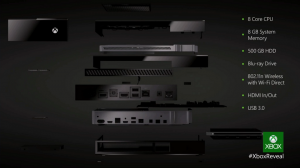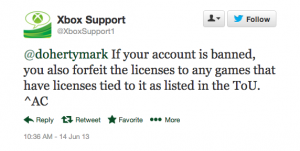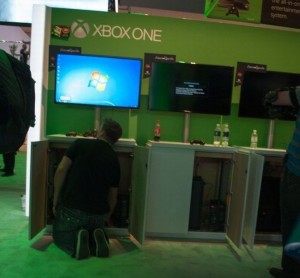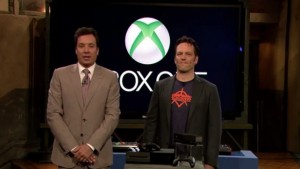
“Is Microsoft ready for the next generation? A detailed investigation on the controversy surrounding the Xbox One, and it’s change in policy after E3 2013.”
By now the dust has cleared, and E3 is well and truly over. It leaves in its wake a veritable whirlwind of in-fighting, awe inspired gasps and fan boasting within the gaming community that will surely last for the next few months. What we got to see were the first glimpses into the next generation of consoles, and the epic new games that they’ll allow us to play. As with every E3, though, there is a battle fought among the audience as to which company deserves the coveted, intangible title of “King of E3”; After some time a general consensus is usually reached and, without a doubt, Sony has been handed this crowning achievement by the collective gaming audiences this year.
So while Microsoft has historically enjoyed a healthy dose of limelight attention in the past, often taking E3 and the gaming world by storm with promises of new games and hardware that leave legions of fanboys drooling, there has been something terribly amiss this year that has caused a shiver to run down the gaming community’s collective spine and has left an awful, DRM-infused taste in our mouths. Reception to the Xbox One has been less than warm, which has dropped the future of this fledgling console in a position of uncertainty. So what exactly has the beehive all stirred up?
The message from Microsoft couldn’t be clearer: The Xbox One is the first step towards an all-digital platform, and will no longer be just a games console. An “All-In-One Entertainment Solution”, as Microsoft called it. However, there was an underlying sense of dishonesty throughout their presentations, and the internet could simply not ignore this. Call it intentional, or just a poor delivery, either way, it certainly wasn’t a genuine approach.
Their E3 conference was oddly quiet about the console, and made no mention of the controversy surrounding their polices. Instead Microsoft used the hour and a half long media briefing to focus almost entirely on games for the new machine, and with good reason as it would turn out. Microsoft instead held a reveal event for the Xbox One a few weeks beforehand, which certainly took an interesting turn when they showcased the new incarnation of a console, which has traditionally been all about the games, and then virtually showed nothing video game related. With just a teaser trailer for Forza 5 and a cryptic, confusing look at Quantum Break, the only solid connection to a game during the event was the announcement that they would be producing a Halo TV series.
Watching that video you could be easily forgiven for thinking that video games were something of an after-thought for the new console, with the focus being on how Xbox One will entirely change the way you veg out to your favorite shows. Using a wide array of new features that utilise hand gestures and voice commands, which further negate the need for physical activity in an activity which was already pretty devoid of the stuff, the Xbox One appears to be over-stretching to ensnare your attention always and forever.
Not a part of this event, however, were details about the features surrounding how video games will function on Xbox One, some of which have sparked a lot of backlash from the gaming community. You can check out a list of them on the Xbox news site here, and here. In addition to these features, there is the need to have your console connected to the internet once every 24 hours to be able to play your games, you can only lend your discs to people who have been on your friends list after thirty days, and there is now the possibility that used games may not work at all because Publishers will be allowed to block second-hand games from registering on another console entirely.
With this in mind, it seems that by dipping a testing toe into the digital-only waters that Microsoft have tripped, fallen in, and are now splashing about aimlessly while trying desperately not to drown. When asked on twitter if having your Xbox Live account banned would still allow you to play your Xbox One games, Microsoft helpfully answered that you were flat out of luck. After some furor from people concerned about the implications of this, they later backtracked to clarify that this wasn’t the case and that they had misunderstood the question.
In another instance, a user asked if someone in a country that wouldn’t have localised Xbox servers were to import the Xbox One from another region, would they then still be able to play games? Apparently not. Even the new Kinect 2.0 with it’s “always on” feature, combined with Microsoft’s involvement with the US government’s PRISM program, has caused enough concern in the gaming community to have spurred legislative action from the US government. So, the exact details on how the console itself will work are still up in the air, and nobody really knows for sure, but at least there was a promise of 15 exclusives in the first year of Xbox One’s release, right?
Right, and E3 definitely delivered on that front! Among the many games which were showcased during the conference, there were a number of exclusives which look amazing: World of Tanks, RYSE: Son of Rome, Killer Instinct, Sunset Overdrive, Forza 5, Minecraft Xbox One Edition, Project Spark, Crimson Dragon, Dead Rising 3, Below and Titan Fall. Whew! What’s more is that all of them look incredible with the new Xbox architecture while still looking as though they run like a dream! What was shown in terms of visual appeal and processing power was an undeniably vast improvement on the X360. Lurking beneath the surface of that shining coat of varnish, however, is something that Microsoft wasn’t particularly ‘up front’ about.
It’s been discovered that the demos that were meant to be on Xbox One machines were, in fact, running on PC’s with Nvidia cards. Similarly, Microsoft was also silent about the need to pay for the character roster in the new free-to-play reboot for Killer Instinct, essentially changing the nature of DLC from paying for additional content to paying for core content.
These issues alone have really diminished the perception of the new console for many, which is holding back what are otherwise some great accomplishments in the Microsoft games lineup for the next generation: Titanfall and Sunset Overdrive are set to change the way that we think about MMO shooters, with improved console hardware and server side cloud processing allowing for the amount of players in any one match to increase tremendously; Project Spark is taking the concept of Little Big Planet and pumping that sucker full of steroids, providing massive, free-roaming and open worlds for players to create games within games for everyone to enjoy; and Quantum Break is attempting to blur the line between television and videogames even further, with developers Remedy Entertainment stating “how you play the game impacts the show, and the show informs how you play the game,” creating a living story and giving players the unique opportunity to affect it, however they see fit.
It’s clear that a lot of the upcoming game releases that are planned out for Xbox One are striving to raise the bar for games in their respective genres and to set a higher standard for the new generation, but the dishonest way that they’re being presented can make one question what is being regarded as the highest priority by the publishers: what is best for our core audience, or how much money can we make out of them? To address those concerns, Microsoft has been extremely about vocal about how much they don’t care.

“We have a product for people who can’t get online, it’s called Xbox 360.” – Don Matrick
In the last few weeks Don Mattrick, President of Interactive Entertainment Business for Microsoft, has done quite a lot of talking to assuage the gaming community’s aggression towards the Xbox One, but in doing so has forgotten the adage of “the customer is always right”. Whether it be responding to complaints about the price tag of Xbox One, angering the armed forces of the world, or telling gamers who’ve been asking for backwards compatibility that they’re simply thinking wrong, the message he’s promoting most really comes across as “Our way is best, and that’s all there is to it.”
The only things that Microsoft haven’t been talking about have been the positive aspects of the new console; while Mattrick has been fouling up the headlines Larry Hryb, a.k.a. Major Nelson, is quietly cleaning up behind him, and even their employees (albeit anonymously) have admitted that the company’s spin on things has been nothing but awful. Even with a promising range of games and a console that, when you consider the direction they’re heading in, is actually quite decent, it isn’t hard to see why gamers are still railing against the Xbox One.
The desire to gradually move next generation consoles towards a digital-only platform is an understandable one; However, an endeavor such as this should not be forced upon the audience to the detriment of that audience’s basic requests, but should be implemented in such a way as to support those requests because to do otherwise would be to alienate the very people who will be supporting your product. It’s this writers opinion that the actions taken by Microsoft so far have been less about ensuring the best interests of the gaming community, and have been more about protecting their own profit margins through the use of over-zealous DRM, doing more harm than good to those who are already abiding by the rules that Microsoft have laid out.
Their demeanor has left many gamers feeling as though they are, in Microsoft’s eyes, unthinking piggy banks that are willing to put up with these over-the-top restrictions, and lose any true sense of ownership of the things that they purchase, simply because a shiny new console is being dangled in front their faces. “Console Wars” once referred to the competition between publishers to outdo one another and produce a console which is clearly better than the others, but this obsessive requirement by Microsoft to control the way we use our games in favor of their own interests has changed the meaning of the term to be closer to “Publishers vs Players”.
There was definitely a strong showing of games at this years E3 conference, but even so, this has certainly not been an entirely successful operation for Microsoft. There are currently many long time Xbox fans pledging that they will not be purchasing the new console due the DRM restrictions, and pre-order sales show that they may infact be falling very far behind the competition. However, is it too far behind to make a comeback? Maybe not.
In an unexpected change of tone, Don Mattrick has released an official announcement on the official Xbox news site stating how they are changing their policies for Xbox One. “An internet connection will not be required to play offline Xbox One games” & “Trade-in, lend, resell, gift, and rent disc based games just like you do today”, these were the two main focus points of his statement. Of course, this is great for countries who would have previously missed out on the console simply because their region wouldn’t have localised servers to be able to support their connection, and for regions or individual players that would have missed out simply because they lacked a sufficient connection, or even a connection at all to allow the console to check-in with the Xbox servers.
However, as would be expected, this will also impact pretty heavily on certain services that had been outlined before this announcement; “These changes will impact some of the scenarios we previously announced for Xbox One. The sharing of games will work as it does today, you will simply share the disc. Downloaded titles cannot be shared or resold. Also, similar to today, playing disc based games will require that the disc be in the tray.” This means we can more than likely say goodbye to the prospect of the “Xbox Family”, and a shared games library.
Of course, this is all excellent news for people who have been against the Xbox One and it’s infamous DRM policies. However, we still get the impression that this isn’t all there is to it. In the above interview between Major Nelson, and online journalist Angry Joe of angryjoeshow.com, Nelson flat out states that removing the 24-hour connection check-in isn’t just a “simple” thing to do, and yet this requirement has now been removed with a day one patch and the Xbox One’s November release date has remained unaffected. What’s up with that Nelson?
If this was in fact just a simple change, and removing region locking was also so simple, what else is there that Microsoft can simply change or remove that has been unpopular with their audience? And why would Microsoft’s biggest spokespeople suggest otherwise until the overwhelming backlash from the gaming community caused them to buckle on the issue and ‘simply’ change it? The reveal of the Xbox One has been marred in dishonesty, and confusing messages. It’s clear that Microsoft now find themselves facing the same issues that Sony faced last generation, and it may still be awhile before gamers are willing to forgive their transgressions. However, if Sony can bounce back from their own arrogant mistakes with the PS3, then surely Microsoft could do the same?















